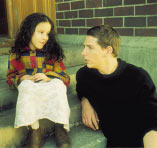

Amy is the type of film that people want to love. It is about a little girl who appears deaf and mute, but people soon discover that she can hear and respond to music. This is another film from Australia, which means that some of the characters in the cast are odd, and that good actors like Rachel Griffiths and Ben Mendelsohn appear. Amy becomes too much of a good thing, changing gears dramatically in the last act for the worse.
Tanya (Griffiths, Blow, Me Myself I) and her young daughter Amy (Alana de Roma) move to a dilapidated neighborhood. Tanya is raising Amy herself, much to the consternation of Social Services. They want Amy to get treatment, but Tanya already spent years looking to see what was wrong. Screenwriter David Tass (The Big Steal, Malcolm) has most of the events taking place in the present, but flashes back frequently to a concert with Tanya, Amy, and Amy's father Will (Australian musician Nick Barker). The story slowly reveals what happened at the concert to cause Amy's behavior.
In their new neighborhood, Tanya and Amy live amongst a broken family, two guys perennially fixing their car, an old woman who continuously waters the sidewalk, and Robert (Mendelsohn, Vertical Limit, Sample People), a musician. He is the person who discovers that Amy can react to music after she keeps coming to listen to him sing. Initially, Tanya is furious, but when she also realizes this, she slowly warms up to Ben. Griffiths is a capable actor, always excellently handling large amounts of stress in her roles. Here, she is a harried mother, trying to care for her daughter and earn a living. De Roma is very good. Child actors so often mug for the camera instead of act. De Roma is in nearly every scene of the movie, and fully embodies the role of Amy. Scenes of her alone at home, rocking back and forth on the floor are heartbreaking, as is the first time people realize she can speak.
Director Nadia Tass (The Miracle Worker, The Liar's Club) stumbles near the end of Amy. For the length of the movie, she manages to tread the line between drama and melodrama. Tass also employs the same oddball humor that is present in many Australian films. The people sure are strange, but they do not seem out of place and do not disrupt the mood of the story. Nevertheless, as Amy draws to and end, Tass goes all out with the syrup, turning Amy into mush. All of the carefully crafted emotion goes out the window. Notwithstanding the ending (and particularly the last scene), Amy is still a good movie, worth the trip it will take to find it playing.